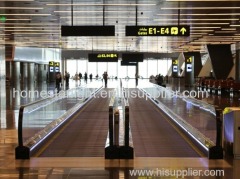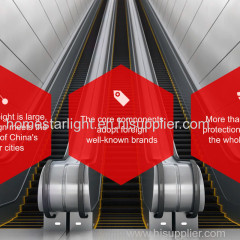
IFE Public Transport Escalator
| Min. Order: | 1000 Set/Sets |
|---|---|
| Payment Terms: | L/C, T/T |
| Supply Ability: | 15000sets |
| Place of Origin: | Guangdong |
Company Profile
| Location: | Dongguan, Guangdong, China (Mainland) |
|---|---|
| Business Type: | Manufacturer |
Product Detail
| Production Capacity: | 15000sets |
|---|---|
| Packing: | WOODEN CASE |
| Delivery Date: | 45days |
Product Description
IFE Public Transport Escalator
An escalator is a type of conveyor that moves people horizontally or vertically between levels of a building or other structure. The public escalator is often used in public transportation systems such as airports, train stations, and shopping malls to help people easily access different levels of the building.
IFE Public Transport Escalator List
GRACES-700
GRACES-700 heavy-haul public transport escalator provides the safest, most comfortable and stable conveying equipment for crowded places such as subways, railway stations and airports.
Why Choose IFE Public Transport Escalator?
GRACES-700 heavy-duty public transport escalator adopts leading technology at home and abroad. And the drive host adopts a two-stage deceleration structure, which is highly efficient and energy-saving.
The full frequency conversion control system is adopted to meet the needs of passenger flow at different times. The safety factor of the drive system reaches more than 8 to meet the safety of the equipment.
The Important Role Of Transport Escalator Plays In Public
In the dense flow of people and other public transportation places safety is particularly important. GRACES-700 escalator static load safety factor can reach more than 8 times, enough to cope with various harsh situation needs, the drive host adopts a two-stage reduction device, the transmission efficiency can reach 95%, effectively reducing power loss.
All metal parts are made of corrosion-resistant materials, and the service life of the whole machine can reach more than 40 years, avoiding frequent replacement of parts during use, reducing the utilization rate of equipment, thereby improving the conveying rate of passengers.
Public Transport Escalator Application
There are several ways that public transport china escalators can be used to improve the overall experience for passengers. Here are a few potential applications:
Improved accessibility: One of the most obvious benefits of using public escalators is that they can make stations more accessible for passengers who have difficulty climbing stairs. By making elevator installations alongside staircases, stations can become more inclusive and allow more people to use public transport.
Increased efficiency: Escalators can also help to improve the flow of passengers through stations. By providing an alternative to stairs, they can reduce congestion on staircases and prevent bottlenecks from forming. This can lead to a smoother and more efficient passenger experience, with fewer delays and less frustration.
Safety features: Escalators can also be equipped with various safety features to enhance passenger safety. For example, sensors can be installed to detect when someone is approaching the escalator and slow it down or stop it if necessary. This can prevent accidents and injuries, particularly for children or elderly passengers who may be more vulnerable.
Advertising space: The railway station escalators can also be used as a space for advertising or informational displays. This can generate revenue for the transport authority while also providing useful information to passengers, such as train schedules or directions to nearby attractions.
Energy efficiency: Modern escalators can also be designed with energy efficiency in mind. For example, they can use sensors to detect when no one is using them and automatically shut down to save energy. They can also be equipped with regenerative braking systems, which can capture and reuse energy that would otherwise be lost as heat.
Overall, there are many potential applications for public transport escalators that can improve the passenger experience, increase efficiency, and enhance safety.
If you want to know more elevators types, please visit our website.


